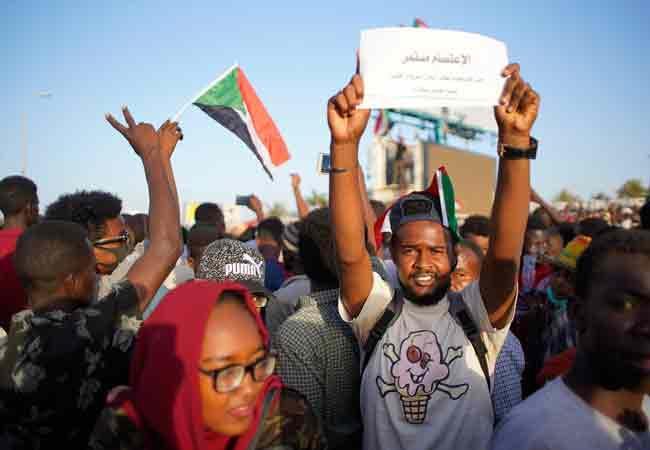
Sudanese protest organizers have presented demands to the country’s new military rulers, urging the creation of a civilian government, the group spearheading demonstrations has said.
Thousands remained encamped outside Khartoum’s army headquarters overnight to keep up the pressure on a military council that took power after ousting veteran leader Omar al-Bashir on April 11.
A 10-member delegation representing the protesters delivered their demands during talks late on April 13, according to a statement by umbrella group the Alliance for Freedom and Change.
“We will continue... our sit-in until all our demands are met,” including the formation of a fully civilian government, one of the alliance’s leaders, Omar al-Degier, said in the statement.
The umbrella group insists that civilian representatives should be accepted onto the military council, and that a fully civilian government should be formed to run day-to-day affairs.
“We surely want our demands to be met, but both sides will have to be flexible to reach a deal,” said a protester who spent the night at the army complex.
US envoy briefed
Meanwhile, Sudan's new military rulers briefed Washington's top envoy to Khartoum on April 14 about security, state media reported.
Steven Koutsis met with the military council's deputy Mohammad Hamdan Daglo, widely known as Himeidti, at the presidential palace in Khartoum.
The Sudanese deputy briefed Koutsis on the current situation in the country and the reason for forming the military council, the official SUNA news agency reported as state television broadcast footage of their meeting.
"Himeidti told him about the measures taken by the military council to preserve the security and stability of the country," SUNA reported.
Himeidti heads Sudan's controversial counter-insurgency unit - the Rapid Support Force (RSF) - which rights groups have accused of abuses in the war-torn Darfur region.
About 300,000 people have been killed in Darfur since a brutal conflict erupted there in 2003, when ethnic rebels took up arms against the Arab-dominated government of Bashir.
The United States, which has blacklisted Sudan as a state sponsor of terrorism, has insisted that Khartoum needs to improve its human rights record if it wants to be removed from the list.
Washington imposed sanctions on Sudan in 1997 for its alleged links to Islamists which were lifted in October 2017, but the much awaited economic recovery has failed to materialize.
‘They have guns, money’
On April 13, the new chief of the military council General Abdel Fattah al-Burhan vowed to dismantle Bashir’s regime and lifted a night time curfew with immediate effect.
Burhan also pledged that individuals implicated in killing protesters would face justice and that protesters detained under a state of emergency imposed by Bashir during his final weeks in power would be freed.
He took the oath of office on April 12 after his predecessor General Awad Ibn Ouf stepped down little more than 24 hours after ousting Bashir.
Tens of thousands of people have massed outside the army headquarters since April 6, initially to urge the armed forces to back their demand that Bashir be removed.
Burhan comes with less baggage from Bashir’s deeply unpopular rule than Ibn Ouf.
But while celebrating the fall of Bashir and then Ibn Ouf - a defense minister and long-time close aide of the deposed president - protesters remain cautious.
Degier said their demands include restructuring the country’s feared National Intelligence and Security Service (NISS), whose chief Salih Ghosh resigned on April 13.
Rights group Amnesty International urged the military council on April 13 to examine Ghosh’s actions during a crackdown against protesters during the final weeks of Bashir’s rule.
“It is crucial that Sudan’s new authorities investigate Salah Ghosh’s role in the killings of scores of Sudanese protesters over the past four months”, said Amnesty’s regional director Sarah Jackson.
The newly formed 10-member transitional council contains several faces from Bashir’s regime.
Late on April 13, the new military ruler named NISS deputy head Jalaluddin Sheikh to the council. He also nominated Himeidti.
One of the protesters taking part in the sit-in outside the army headquarters said he was ambivalent about Himeidti’s appointment.
“We don’t have many options - they [the RSF] have guns, they have money,” said Mohamed, who gave only his first name for security reasons.
“Himeidti was part of the crimes that happened previously but at least now he is on the side of the people,” he added.
Key regional power-brokers Saudi Arabia and the UAE voiced backing for the transitional council.
Burhan’s nomination “reflects the ambitions of the brotherly people of Sudan for security, stability and development”, UAE state news agency WAM said.
Saudi Arabia has promised an aid package, the Saudi Press Agency reported on April 13.
Sudan is part of a UAE and Saudi-led military coalition fighting Iran-backed Huthi rebels in Yemen.
That marked a dramatic shift by Khartoum, aligning itself with the Gulf Arab monarchies and dropping close ties with their arch-rival Iran.
The International Criminal Court has longstanding arrest warrants against Bashir for suspected war crimes during the regime’s brutal campaign of repression in Darfur, where a decade-and-a-half of conflict has killed 300,000 people.
Amnesty demanded on April 13 the deposed president to be handed over to the court.
But the military council has said it would never extradite Bashir or any other Sudanese citizen.